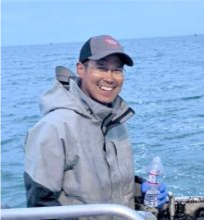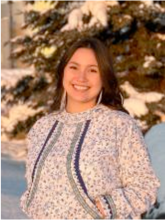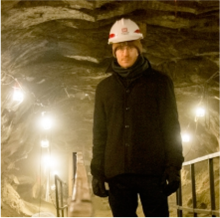By Craig Chythlook, Taniesha Moses, and Joed Polly
Since 2018, the Arctic Indigenous Scholars, an initiative developed by ARCUS and the Inuit Circumpolar Council (ICC) Alaska, has provided a platform for Indigenous scholars to educate policymakers in Washington, DC. For the purposes of this program, an “Indigenous scholar” is defined as anyone who is considered to be an expert within their own knowledge system, regardless of formal education or training. Twelve scholars have participated since the program’s inception, including hunters, fishers, gatherers, food processors, health aides, and other community members.
Craig Chythlook and Taniesha Moses traveled to Washington, DC to meet with decision and policy-makers during 4-8 March 2024. The following interviews and video documentaries were produced by Joed Polly, ARCUS.
Craig Chythlook
Tell me your name and a little bit about the community that you are part of.
Hi my name is Craig Chythlook. The communities that I'm a part of first off is originally from the Bristol Bay Area. I grew up in Dillingham, Alaska. I still make it out there every summer. My folks live out there, our family has been in that neck of the woods for quite a while.
I'm a Tamamta fellow at the University of Alaska Fairbanks, graduate student there, getting my interdisciplinary master's degree. My work is focused around resource management and most importantly, representation in decision-making spaces. My work with the Tamamta fellowship right now is going to be focusing on data, data sovereignty.
Tell me about your work as an Indigenous Scholar.
I have been inspired through frustration in the regulatory process. We are always having to follow the definitions that were created for our communities and tribes by state and federal agencies and departments. Subsistence is a really good example. The state has a definition that is very objective. It's a calorie exchange with some opportunities to do and participate and enact. And it doesn't explain anything about the Indigenous way of life. There's no soul or passion behind the explanation of the definition, relationality to place, and it's very generalized. So, what I'm looking forward to with my existing and future work, is allowing opportunities for our communities and community members and leaders to define for themselves the importance of our Indigenous way of life and how our values and principles should engage and interact and lead decisions around policy and regulatory.
What did you get out of the experience of being Indigenous Scholar?
The experience has been really good so far. So my interest in fisheries governance and management, I was pretty excited about the NOAA folks and different line offices that we had an opportunity to meet with. My reasoning for applying was to have an opportunity to come down here and just share thoughts, feelings, frustrations. We have a very unique opportunity to have one-on-one time with senior advisors, with directors of offices. I was really hoping to get an opportunity to share my issues and concerns. I was really hoping to get an opportunity to hear feedback about what are some of the barriers, what are some of the gaps, and it was noted during this trip here about some of the blind spots that the tribes, consortia, the fellowships, the whatever, us as Indigenous advocates continue, can continue to look at, advocate, and fill those blind spots and gaps with our own Indigenous perspective and knowledge, based on our own information, not somebody else's like the University, or other agency, or department staff, that are not Indigenous.
We've had really good opportunity with NOAA, EPA, NSF, science communications specialists down here and it's definitely been completely worthwhile in my opinion. I'm really looking forward to the follow-ups, and continuing to build off the relationships that were made because of this fellowship, because of the opportunity that ARCUS has been, you know like very intentional with getting us involved with people that are relatively high up in decision-making, number one. But honestly a lot of the agencies reached out to ARCUS once the call of the Arctic Indigenous fellowship was announced, because I think even they recognize this is a really good opportunity to meet with Indigenous fellows, scholars, about issues concerns that they have in their portfolios, and maybe get a little bit of ground truthing I hope with with some of my thought and expectation. And honestly, I can, I feel that way. That through whether it's mutual frustration, or having an opportunity to have broader and more in-depth conversations about certain issues and concerns that are near and dear to all of our hearts, we have had a lot of good chance to sit down and have real conversations.
Did you make any useful connections as an Indigenous Scholar? If so, can you give an example of one that stuck with you?
I think the most meaningful engagement that I've had so far actually has been with Zach Penney. That was definitely one of the most meaningful times here. Because we can relate a little bit to one another about those thoughts and feelings about talking into the void when we're sharing our perspectives and our indigenous values.
So it's meetings like this that we have an opportunity to see examples of best practices by leadership that have been in the trenches, have been getting their butts kicked, understand our frustrations, and can give us very meaningful feedback and guidance on best practices learned and opportunities to kind of build relationships and hopefully collaborate more in the future.
What will you bring back to your communities?
I think one of the biggest bits of information that I will bring back to our home communities and all the different things that I'm working on, again, we hear this time and time again, but it's the reiteration of how important it is to participate in all of these different processes. Our conversations with folks from NOAA – some of the best bits of information that I got regarding the importance of participation, representation, is to again continue to bring our issues and concerns to the forefront, but also build community around the issues and concerns that we have in the Arctic. We want to build representation and within that representation, solidarity. So when we're dealing with issues and concerns that are difficult in difficult spaces, we have more allyship and better representation. So I think that's probably the biggest message that I'm going to bring home.
Anything else that you’d like to add?
For me this was a very awesome learning experience. I think learning and understanding the limitations and learning more and more about how to contribute and participate meaningfully in decision-making was a really, really important part of this trip for me. And just meeting people. Again, seeing that all of these names that we see in organization charts are just people looking to do good work. Everybody is very passionate here. It's important to represent the passion from our communities in these decision-making spaces so that when the time comes to have influence, we're here, we're very actively engaged, and we continue to move the needle in the directions that we, we see fit, that our communities see fit, and are reflective of our interests and concerns.
Taniesha Moses
Tell me your name and a little bit about the community that you are part of.
Hi, my name's Taniesha Moses. I'm Upper Tanana Athabaskan. I'm originally from Northway, Alaska, a small village next to the Canadian border on the road system. Right now I currently live in Fairbanks, Alaska.
Tell me about your work as an Indigenous Scholar.
So my background is in social work and I am really curious about ways to improve wellness in my community, within myself, and within for future generations. And I think that part of being well is also our environment being well. So learning more about how to advocate for not only our people but our environment too.
And in Northway there were hazardous materials that were buried in the ground and we've also seen high cancer rates amongst our elders and we've lost almost like an entire generation of people that aren't able to pass down their knowledge and that knowledge is very valuable. When we lose our elders we're not just losing a person we're losing access to knowledge from time immemorial. And I feel a big responsibility to pass that down to my children and I haven't even learned or I don't really have access to learning from my own family anymore, so I really have to try harder and put intentional effort on top of you know... surviving.
What did you get out of the experience of being Indigenous Scholar?
I will be graduating with my masters in social work in May, and my focus is on Indigenous research. This opportunity to come to Washington DC really helped me to be able to kind of make those connections, just understand the government system as a whole, and just like how things work, where the power lies. And if anybody is wanting to advocate for their people, for their community – you know it can be very frustrating and it's very daunting just trying to understand how the government works in general and like where the power, where money comes from. So I think just being here and getting to meet people and just learn about all the different departments and how things work, it's been super valuable.
Did you make any useful connections as an Indigenous Scholar? If so, can you give an example of one that stuck with you?
I had the opportunity to meet with the EPA, specifically the International and Tribal Affairs department. They were really welcoming and they were able to talk to me about my specific community and the cleanup efforts and just kind of like what they're able to do and what they're not able to do, as far as like, is our food safe to eat? You know, am I going to get cancer, are my kids going to get cancer by eating these foods that we grew up eating?
What will you bring back to your communities?
When I go home I'm going to bring this opportunity, just my entire experience of being here in Washington DC, ARCUS really helped to facilitate different meetings but I think just being able to share my story and just understand how things work here. I'm interested in learning how to advocate more and just being more aware of you know different things that are going on within our government that might impact our people. I think this whole experience has just really taught me how unique Alaska is and why it's so important to be able to share your voice and also just the importance of relationships and building those connections. I think that wouldn't have been possible unless I came here.
Anything else that you’d like to add?
You know, something that ARCUS kind of created time and space for us is to go to the Smithsonian archives and look at what they have in their storage. So I was able to look at, you know, pieces from my region and Alaska in general, from the last like few hundred years. I think they had stuff from maybe like early 1800s. I was actually looking specifically for stuff from my region and there wasn't very many pieces from Upper Tanana Athabaskan specifically, but I think that that's both a good thing and a bad – not a bad thing – I was really hoping to see something like really old, but also it just shows that we weren't... we were a little bit protected because of our location being so secluded where we are. But, so it was bittersweet, but being able to touch, and smell, and see like really old things, it was, like I said bittersweet, just because it's there and it's not in Alaska, but also to be able to preserve that, and be able to see that, and see like the art and the beauty and just the pure artistry that our people had, was a really special and emotional experience.
Acknowledgements
The Arctic Indigenous Scholars Program is supported by the National Science Foundation's Division of Arctic Sciences (PLR-1928794) with additional support from the Smithsonian National Museum of Natural History Arctic Studies Center. We are grateful to the 2024 program selection committee, Carolina Behe, Raychelle Daniel, Kimberly Pikok, and Cyrus Harris. Thank you to the following organizations for hosting 2024 Arctic Indigenous Scholars: Smithsonian Arctic Studies Center, National Science Foundation, National Oceanographic and Atmospheric Administration, Federation of American Scientists, Senator Lisa Murkowski, US Environmental Protection Agency, and Representative Mary Peltola.
About the Authors
 Craig Chythlook is Yup’ik originally from the Bristol Bay region in southwest Alaska. Craig’s parents are Joe and Molly Chythlook from Dillingham, AK. Craig has spent his life fishing for salmon on the waters of Bristol Bay. Craig’s current work is looking at what evaluation criteria are used to measure success while observing salmon, salmon management, and how to utilize Indigenous values and place-based knowledge into resource management decision-making. Craig graduated from the University of Alaska Fairbanks with a business administration degree and a minor in rural development. While attending UAF, Craig spent three and a half years participating in undergraduate research studying how better access to water utility services impact subsistence activities. Craig’s research interests include how the Bristol Bay communities can better include Indigenous and place-based knowledge into state and federal decision-making spaces, regarding salmon/resource management.
Craig Chythlook is Yup’ik originally from the Bristol Bay region in southwest Alaska. Craig’s parents are Joe and Molly Chythlook from Dillingham, AK. Craig has spent his life fishing for salmon on the waters of Bristol Bay. Craig’s current work is looking at what evaluation criteria are used to measure success while observing salmon, salmon management, and how to utilize Indigenous values and place-based knowledge into resource management decision-making. Craig graduated from the University of Alaska Fairbanks with a business administration degree and a minor in rural development. While attending UAF, Craig spent three and a half years participating in undergraduate research studying how better access to water utility services impact subsistence activities. Craig’s research interests include how the Bristol Bay communities can better include Indigenous and place-based knowledge into state and federal decision-making spaces, regarding salmon/resource management.
 Taniesha Moses, originally from Northway, Alaska, is deeply committed to learning and embracing her cultural heritage as an Upper Tanana Athabascan. After earning her Bachelor of Social Work from the University of Alaska Fairbanks in 2021, she received a Master's in Social Work with a focus on Indigenous Research at the University of Alaska Anchorage in 2024.
Taniesha Moses, originally from Northway, Alaska, is deeply committed to learning and embracing her cultural heritage as an Upper Tanana Athabascan. After earning her Bachelor of Social Work from the University of Alaska Fairbanks in 2021, she received a Master's in Social Work with a focus on Indigenous Research at the University of Alaska Anchorage in 2024.
Motivated by her role as a mother, Taniesha recognizes the importance of understanding and appreciating her cultural roots so that she can pass them down to the next generation. Her passion for the Arctic Indigenous Scholar program stems from a desire to engage with diverse experiences and advocate for issues affecting her community, with a specific interest in the preservation of food sovereignty.
Taniesha's primary concern centers around the significance of traditional foods in her community, not just as sustenance but as a reflection of holistic health. As an Arctic Indigenous Scholar, she aims to bridge the gap between her community and government officials, advocating for policies that respect and support their traditional way of life. Post-program, Taniesha plans to use her knowledge to promote wellness and preserve traditional ways of life, embodying a commitment to continuous learning and cultural understanding.
About the Interviewer
 Joed Polly contracts with ARCUS on a variety of video production, including recording conferences and meetings, editing promotional outreach videos for ARCUS and PolarTREC, and making them available online. After graduating from the University of Massachusetts Boston in 2005, with a degree in Art, Joed has continued to live in the Boston area. In his free time he enjoys making short movies, photography, making large sculptures, hiking, camping, petting dogs, and eating tasty food. Come May or June, Joed feels like something just isn't quite right, and he has to return to Fairbanks to get in some midnight sun.
Joed Polly contracts with ARCUS on a variety of video production, including recording conferences and meetings, editing promotional outreach videos for ARCUS and PolarTREC, and making them available online. After graduating from the University of Massachusetts Boston in 2005, with a degree in Art, Joed has continued to live in the Boston area. In his free time he enjoys making short movies, photography, making large sculptures, hiking, camping, petting dogs, and eating tasty food. Come May or June, Joed feels like something just isn't quite right, and he has to return to Fairbanks to get in some midnight sun.
